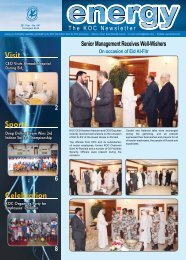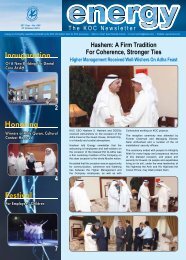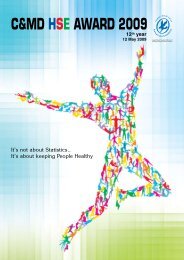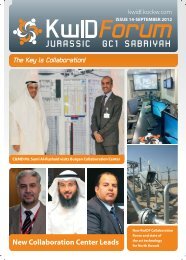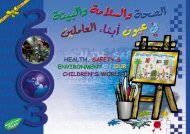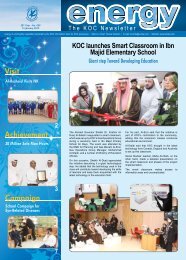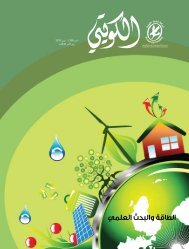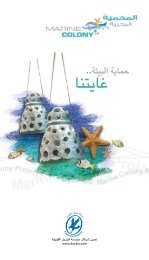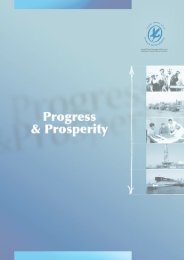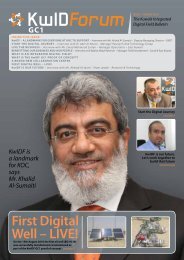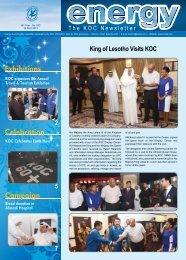4 - Kuwait Oil Company
4 - Kuwait Oil Company
4 - Kuwait Oil Company
You also want an ePaper? Increase the reach of your titles
YUMPU automatically turns print PDFs into web optimized ePapers that Google loves.
production rose from 80 millionm 3 /year in the late 1950s to 610million m 3 /year in 2010 while percapita consumption of freshwaterrose from 21 m 3 /year in 1959 to163 m 3 /year in 2010. Accordingto information published by Dr.Kotwicki, if the present waterconsumption trend continues, aquadrupling of water desalinationwould be required by 2025. What,then, is <strong>Kuwait</strong> doing to guaranteea water supply for its future?The Way ForwardIn his interview with The <strong>Kuwait</strong>iDigest, Dr. Kotwicki pointed outthat to put the water issue intoperspective, we should considerthe fact that 100,000 people areadded to the planet every day.In a month, that is equivalent toapproximately 3 million people,roughly the same amount of peoplewho live in <strong>Kuwait</strong>. All thesenew people will be competingfor a very limited water supply,and if measures are not taken toadequately prepare for the world’sfuture water needs, the results maybe catastrophic.“We should treat water with morereverence,” said Dr. Kotwicki,adding that he believes peopletoday treat water as a simplecommodity instead of life’s mostvaluable resource. “Water is themost important thing in life –we’d die in a few days withoutit. Without water there wouldbe no life. Everything aroundus was created by water,” saidDr. Kotwicki, who maintainedthat educating people, especiallythe young generation, about theimportance of water is a goodfirst step toward getting them tocare about life’s most importantresource. As the <strong>Kuwait</strong>i proverbgoes, he said, “What is learned inyouth is carved in stone.”Despite being in the precariousposition of using an amount ofwater that is many times morethan what nature can sustain, Dr.Kotwicki believes that the futurecan be promising if we makepreparations today for the futureneeds of tomorrow. There aresolutions, he maintains, that canhelp us solve future water needs.Dr. Kotwicki believes that thereis a good side to <strong>Kuwait</strong>’s waterconsumption. “When we use moreand more water, we producemore and more wastewater, whichcan be used as a resource. Forexample, the Sulaibiya Plant, whichwas commissioned in 2005, is oneof the biggest wastewater treatmentplants in the world. It uses ReverseOsmosis (RO) technology ontop of the primary, secondaryand tertiary treatments, whichinclude mechanical treatment, thenbiological treatment and chemicaltreatment. If you use RO on top ofthe tertiary treatment, you will havewater that is better than water fromthe tap.”However clean this water may be,Dr. Kotwicki acknowledges thefact that many people would beunwilling to drink wastewater thathas been converted to pure water,no matter how clean it may be.Surprisingly, this water is so purethat even the majority of farmersprefer to not use it because ofits lack of essential nutrients andminerals, which have to be addedif it is to be used for agriculturalpurposes. What, then, can be donewith this water?“What we should do,” Dr. Kotwickisaid, “is put this water in the36October - December 2012



